- Home
- James Herriot
The Lord God Made Them All Page 2
The Lord God Made Them All Read online
Page 2
I dallied with the idea of shouting for help, but that would have been just too absurd. There was nothing else for it. I seized the top rail in both hands and pushed upwards, trying to close my ears to the tearing sounds from my garments, then, very slowly, I eased my way to safety.
I left the gate lying where it was. Normally I meticulously close all gates behind me but there were no cattle in the fields and anyway, I had had enough of this one.
I rapped sharply at the farmhouse door and Mrs. Ripley answered.
“Now then, Mr. Herriot, it’s grand weather,” she said. Her carefree smile reminded me of her husband’s as she wiped at a dinner plate and adjusted the apron around her ample midriff.
“Yes … yes … it is. I’ve called to see your cow. Is your husband in?”
She shook her head. “Nay, ’e hasn’t got back from t’Fox and Hounds yet.”
“What!” I stared at her. “That’s the pub at Diverton, isn’t it? I thought he had an urgent case for me to see.”
“Aye, well, he had to go across there to ring ye up. We haven’t no telephone here, ye know.” Her smile widened.
“But—but that was nearly an hour since. He should have been back here long ago.”
“That’s right,” she said, nodding with perfect understanding. “But he’ll ’ave met some of his pals up there. They all get into t’Fox and Hounds on a Sunday mornin’.”
I churned my hair around. “Mrs. Ripley, I’ve left my meal lying on the table so that I could get here immediately!”
“Oh, we’ve ’ad ours,” she replied, as though the words would be a comfort to me. And she didn’t have to tell me. The rich scent drifting from the kitchen was unmistakably roast beef, and there was no doubt at all it would have been preceded by Yorkshire pudding.
I didn’t say anything for a few moments, then I took a deep breath. “Well, maybe I can see the cow. Where is she, please?”
Mrs. Ripley pointed to a box at the far end of the yard.
“She’s in there.” As I set off across the cobbles she called after me. “You can be lookin’ at her till ’e gets back. He won’t be many minutes.”
I flinched as though a lash had fallen across my shoulders. Those were dreadful words. “Not many minutes” was a common phrase in Yorkshire and could mean anything up to two hours.
I opened the half-door and looked into the box at the cow. She was very lame, but when I approached her she hopped around in the straw, dotting the injured limb on the ground.
Well, she hadn’t a broken leg. She couldn’t take her weight on it, but there was none of the typical dangling of the limb. I felt a surge of relief. In a big animal a fracture usually meant the humane killer because no number of plaster bandages could take the strain. The trouble seemed to be in her foot but I couldn’t catch her to find out. I’d have to wait for Mr. Ripley.
I went out into the afternoon sunshine and gazed over the gently rising fields to the church tower of Diverton pushing from the trees. There was no sign of the farmer and I walked wearily beyond the buildings onto the grass to await his coming.
I looked back at the house, and even through my exasperation I felt a sense of peace. Like many of the older farms, Anson Hall had once been a noble manor. Hundreds of years ago some person of title had built his dwelling in a beautiful place. The roof looked ready to fall in and one of the tall chimney stacks leaned drunkenly to one side, but the mullioned windows, the graceful arched doorway and the stately proportions of the building were a delight, with the pastures beyond stretching towards the green fells.
And that garden wall. In its former glory the sun-warmed stones would have enclosed a cropped lawn with bright flowers, but now there were only nettles. Those nettles fascinated me; a waist-high jungle filling every inch of space between wall and house. Farmers are notoriously bad gardeners but Mr. Ripley was in a class by himself.
My reverie was interrupted by a cry from the lady of the house. “He’s comin’, Mr. Herriot. I’ve just spotted ’im through the window.” She came round to the front and pointed towards Diverton.
Her husband was indeed on his way, a black dot moving unhurriedly down through the fields and we watched him together for about fifteen minutes until at last he squeezed himself through a gap in a wall and came up to us, the smoke from his pipe rising around his ears.
I went straight into the attack. “Mr. Ripley, I’ve been waiting a long time! You asked me to come straight away!”
“Aye, ah knaw, ah knaw, but I couldn’t very well ask to use t’phone without havin’ a pint, could I?” He put his head on one side and beamed at me, secure in his unanswerable logic.
I was about to speak when he went on. “And then Dick Henderson bought me one, so I had to buy ’im one back, and then I was just leavin’ when Bobby Talbot started on about them pigs he got from me last week.”
His wife chipped in with bright curiosity. “Eee, that Bobby Talbot! Was he there this mornin’, too? He’s never away from t’pub, that feller. I don’t know how his missus puts up with it.”
“Aye, Bobby was there, all right. He allus is.” Mr. Ripley smiled gently, knocked his pipe out against his heel and began to refill it. “And ah’ll tell you who else ah saw—Dan Thompson. Haven’t seen ’im since his operation. By gaw, it has fleeced him—he’s lost a bit o’ ground. Looks as though a few pints would do ’im good.”
“Dan, eh?” Mrs. Ripley said eagerly. “That’s good news, any road. From what I heard they thought he’d never come out of t’hospital.”
“Excuse me,” I broke in.
“Nay, nay, that was just talk,” Mr. Ripley continued. “It was nobbut a stone in t’kidney. Dan’ll be all right. He was tellin’ me …
I held up a hand. “Mr. Ripley, can I please see this cow? I haven’t had my lunch yet. My wife put it back in the oven when you phoned.”
“Oh, I ’ad mine afore I went up there.” He gave me a reassuring smile and his wife nodded and laughed to put my mind fully at rest.
“Well, that’s splendid,” I said frigidly. “I’m glad to hear that.” But I could see that they took me at my word. The sarcasm was lost on them.
In the loose box Mr. Ripley haltered the cow and I lifted the foot. Cradling it on my knee I scraped away the caked muck with a hoof knife and there, glinting dully as the sunshine slanted in at the door, was the cause of the trouble. I seized the metal stud with forceps, dragged it from the foot and held it up.
The farmer blinked at it for a few seconds, then his shoulders began to shake gently. “One of me own hobnails. Heh, heh, heh. Well, that’s a rum ’un. Ah must’ve knocked it out on t’cobbles; they’re right slippery over there. Once or twice I’ve nearly gone arse over tip. I was sayin’ to t’missus just t’other day …”
“I really must get on, Mr. Ripley,” I interposed. “Remember, I still haven’t had my lunch. I’ll just slip out to the car for an antitetanus injection for the cow.”
I gave her the shot, dropped the syringe into my pocket and was on my way across the yard when the farmer called after me.
“Have ye got your nippers with ye, Mr. Herriot?”
“Nippers …?” I halted and looked back at him. I couldn’t believe this. “Well, yes, I have, but surely you don’t want to start castrating calves now?”
The farmer flicked an ancient brass lighter and applied a long sheet of flame to the bowl of his pipe. “There’s nobbut one, Mr. Herriot. Won’t take a minute.”
Ah, well, I thought, as I opened the boot and fished out the Burdizzo from its resting place on my calving overall. It didn’t really matter now. My Yorkshire pudding was a write-off, a dried-up husk by now, and the beef and those gorgeous fresh vegetables would be almost cremated. All was lost, and nipping a calf wasn’t going to make any difference.
As I turned back, a pair of double doors at the end of the yard burst open and an enormous black animal galloped out and stood looking around him warily in the bright sunshine, pawing the ground and swishing his tail b
ad-temperedly. I stared at the spreading horns, the great hump of muscle on the shoulder and the coldly glittering eyes. It only needed a blast on a trumpet and sand instead of cobbles and I was in the Plaza de Toros in Madrid.
“Is that the calf?” I asked.
The farmer nodded cheerfully. “Aye, that’s ’im. I thowt I’d better run ’im over to the cow house so we could tie ’im up by the neck.”
A wave of rage swept over me and for a moment I thought I was going to start shouting at the man, then, strangely, I felt only a great weariness.
I walked over to him, put my face close to his and spoke quietly. “Mr. Ripley, it’s a long time since we met, and you’ve had plenty of opportunities to keep the promise you made me then. Remember? About getting your calves nipped when they were little and about replacing that gate? Now look at that great bull and see what your gate has done to my clothes.”
The farmer gazed with genuine concern at the snags and tears in my trousers and reached out to touch a gaping rent in my sleeve.
“Eee, I’m right sorry about that.” He glanced at the bull. “And I reckon ’e is a bit big.”
I didn’t say anything and after a few moments the farmer threw up his head and looked me in the eye, a picture of resolution.
“Aye, it’s not right,” he said. “But ah’ll tell ye summat. Just nip this ’un today, and I’ll see nowt of this ever happens again.”
I wagged a finger at him. “But you’ve said that before. Do you really mean it this time?”
He nodded vigorously. “Ah’ll guarantee it.”
Strangely, the familiar hollow promise did not irk me as I might have expected. Perhaps it was because I’d been away from Yorkshire so long, seeing a world changing faster than I sometimes liked, but this homely sign of immutability tickled me. I chuckled. And then I began to laugh. “A-ha,” I bubbled, “a-ha-ha-ha!” Soon Mrs. Ripley got caught up with it. “Hee!” she agreed. “Hee-hee! Hee-hee!” And Mr. Ripley took his pipe from his mouth with great deliberation and said, “Heh. Heh-heh. Hehheh-heh.” And the three of us stood there, bawling away a Sunday afternoon together.
Just then the bull snorted derisively.
“Aye, it’s true,” Mr. Ripley stammered through his laughter, wiping his eyes. “If ah was in your place, I wouldn’t be laughing either.”
Chapter
2
“OOOH … OOH-HOO-HOOO!” THE BROKEN-HEARTED sobbing jerked me into full wakefulness. It was 1 A.M., and after the familiar jangling of the bedside phone I expected the gruff voice of a farmer with a calving cow. Instead, there was this terrible sound.
“Who is this?” I asked a little breathlessly. “What on earth is the trouble?”
I heard a gulping at the other end and then a man’s voice pleading between sobs, “It’s Humphrey Cobb. For God’s sake, come out and see Myrtle. I think she’s dyin’.”
“Myrtle?”
“Aye, me poor little dog. She’s in a ’ell of a state! Oooh-hooo!”
The receiver trembled in my grasp. “What is she doing?”
“Oh, pantin’ and gaspin’. I think it’s nearly all over with ’er. Come quick!”
“Where do you live?”
“Cedar House. End of Hill Street.”
“I know it. I’ll be there very soon.”
“Oh, thank ye, thank ye. Myrtle hasn’t got long. Hurry, hurry!”
I leaped from the bed and rushed at my clothes, draped over a chair against the wall. In my haste, in the darkness, I got both feet down one leg of my working corduroys and crashed full length on the floor.
Helen was used to nocturnal calls and often she only half awoke. For my part, I always tried to avoid disturbing her by dressing without switching on the light, using the glow from the night light we kept burning on the landing for young Jimmy.
However, the system broke down this time. The thud of my falling body brought her into a sitting position.
“What is it, Jim? What’s happening?”
I struggled to my feet. “It’s all right, Helen, I just tripped over.” I snatched my shirt from the chair back.
“But what are you dashing about for?”
“Desperately urgent case. I have to hurry.”
“All right, Jim, but you won’t get there any sooner by going on like this. Just calm down.”
My wife was right, of course. I have always envied those vets who can stay relaxed under pressure. But I wasn’t made that way.
I galloped down the stairs and through the long back garden to the garage. Cedar House was only a mile away and I didn’t have much time to think about the case, but by the time I arrived I had pretty well decided that an acute dyspnoea like this would probably be caused by a heart attack or some sudden allergy.
In answer to my ring the porch light flashed on, and Humphrey Cobb stood before me. He was a little round man in his sixties, and his humpty-dumpty appearance was accentuated by his gleaming bald head.
“Oh, Mr. Herriot, come in, come in,” he cried brokenly as the tears streamed down his cheeks. “Thank ye for gettin’ out of your bed to help me poor little Myrtle.”
As he spoke, the blast of whisky fumes almost made my head spin and I noticed that as he preceded me across the hall he staggered slightly.
My patient was lying in a basket by the side of an Aga cooker in a large, well-appointed kitchen. I felt a warm surge when I saw that she was a beagle like my own dog, Sam. I knelt down and looked at her closely. Her mouth was open and her tongue lolled, but she did not seem to be in acute distress. In fact, as I patted her head her tail flapped against the blanket.
A heart-rending wail sounded in my ear. “What d’ye make of her, Mr. Herriot? It’s her heart, isn’t it? Oh, Myrtle, Myrtle!” The little man crouched over his pet, and the tears flowed unchecked.
“You know, Mr. Cobb,” I said. “She doesn’t seem all that bad to me, so don’t upset yourself too much. Just give me a chance to examine her.”
I placed my stethoscope over the ribs and listened to the steady thudding of a superbly strong heart. The temperature was normal, and I was palpating the abdomen when Mr. Cobb broke in again.
“The trouble is,” he gasped, “I neglect this poor little animal.”
“What do you mean?”
“Well, ah’ve been all day at Catterick at the races, gamblin’ and drinkin’, with never a thought for me dog.”
“You left her alone all that time in the house?”
“Nay, nay, t’missus has been with her.”
“Well, then.” I felt I was getting out of my depth. “She would feed Myrtle and let her out in the garden?”
“Oh aye,” he said, wringing his hands. “But I shouldn’t leave ’er. She thinks such a lot about me.”
As he spoke, I could feel one side of my face tingling with heat. My problem was suddenly solved.
“You’ve got her too near the Aga,” I said. “She’s panting because she’s uncomfortably hot.”
He looked at me doubtfully. “We just shifted ’er basket today. We’ve been gettin’ some new tiles put down on the floor.”
“Right,” I said. “Shift it back again and she’ll be fine.”
“But Mr. Herriot.” His lips began to tremble again. “It’s more than that. She’s sufferin’. Look at her eyes.”
Myrtle had the lovely big liquid eyes of her breed and she knew how to use them. Many people think the spaniel is number one when it comes to looking soulful, but I personally plump for the beagle. And Myrtle was an expert.
“Oh, I shouldn’t worry about that, Mr. Cobb,” I said. “Believe me, she’ll be all right.”
He still seemed unhappy. “But aren’t ye going to do something?”
It was one of the great questions in veterinary practice. If you didn’t “do something,” they were not satisfied. And in this case, Mr. Cobb was in greater need of treatment than his pet. Still, I wasn’t going to stick a needle into Myrtle just to please him so I produced a vitamin tablet from my bag and pushed
it over the back of the little animal’s tongue.
“There you are,” I said. “I’m sure that will do her good.” And after all, I thought, I wasn’t a complete charlatan—it wouldn’t do her any harm.
Mr. Cobb relaxed visibly. “Eee, that’s champion. You’ve set me mind at rest.” He led the way into a luxurious drawing room and tacked unsteadily towards a cocktail cabinet. “You’ll ’ave a drink before you go?”
“No, really, thanks,” I said. “I’d rather not, if you don’t mind.”
“Well, I’ll ’ave a drop. Just to steady me nerves. I was that upset.” He tipped a lavish measure of whisky into a glass and waved me to a chair.
My bed was calling me, but I sat down and watched as he drank. He told me that he was a retired bookmaker from the West Riding and that he had come to Darrowby only a month ago. Although no longer directly connected with horse racing, he still loved the sport and never missed a meeting in the north of England.
“I allus get a taxi to take me and I have a right good day.” His face was radiant as he recalled the happy times, then for a moment his cheeks quivered and his woebegone expression returned. “But I neglect me dog. I leave her at home.”
“Oh nonsense,” I said. “I’ve seen you out in the fields with Myrtle. You give her plenty of exercise, don’t you?”
“Oh aye, lots of walks every day.”
“Well, then she really has a good life. This is just a silly little notion you’ve got.”
He beamed at me and sloshed out another few fingers of whisky. “Eee, you’re a good lad. Come on, you’ll just have one before you go.”
“Oh, all right, just a small one, then.”
As we drank he became more and more benign until he was gazing at me with something like devotion.
“James Herriot,” he slurred. “I suppose it’ll be Jim, eh?”
“Well, yes.”
“I’ll call you Jim, then, and you can call me Humphrey.”
“Okay, Humphrey,” I said, and swallowed the last of my whisky. “But I really must go now.”

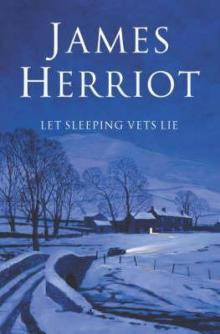 Let Sleeping Vets Lie
Let Sleeping Vets Lie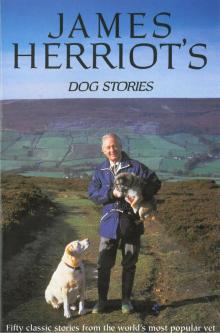 James Herriot's Dog Stories
James Herriot's Dog Stories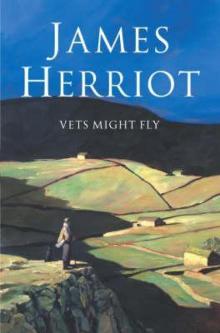 Vets Might Fly
Vets Might Fly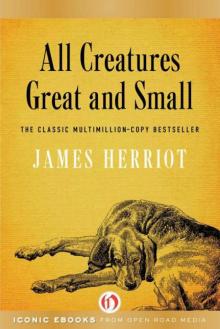 All Creatures Great and Small
All Creatures Great and Small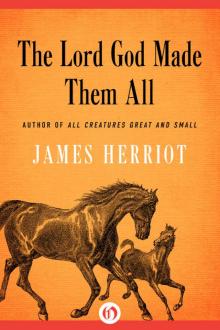 The Lord God Made Them All
The Lord God Made Them All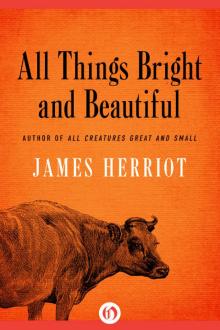 All Things Bright and Beautiful
All Things Bright and Beautiful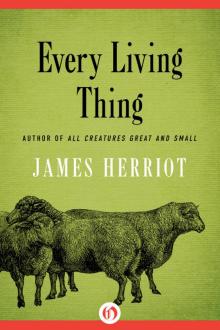 Every Living Thing
Every Living Thing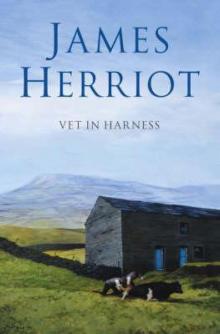 Vet in Harness
Vet in Harness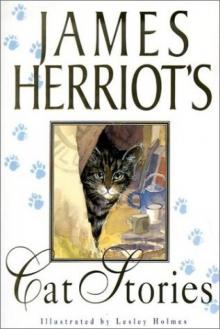 James Herriot's Cat Stories
James Herriot's Cat Stories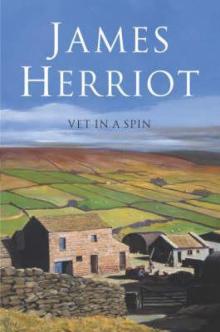 Vet in a Spin
Vet in a Spin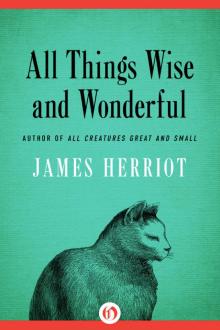 All Things Wise and Wonderful
All Things Wise and Wonderful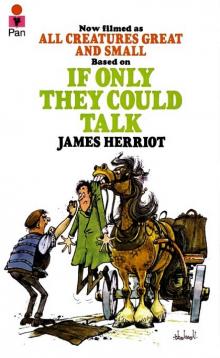 If Only They Could Talk
If Only They Could Talk